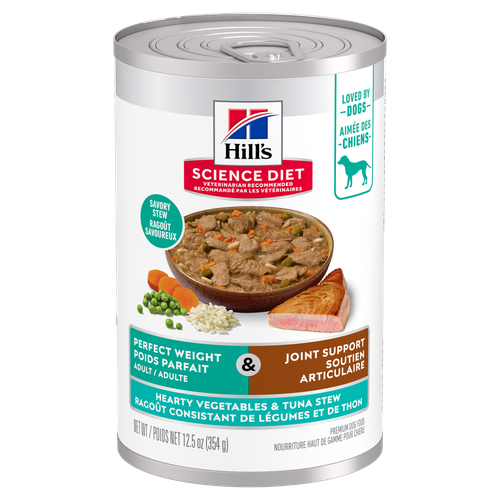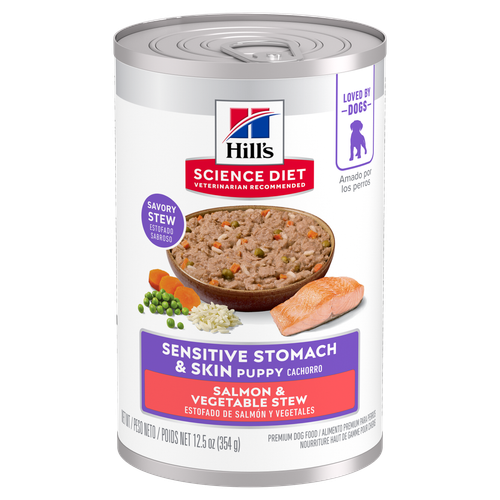
-
Find the right food for your petTake this quiz to see which food may be the best for your furry friend.Find the right food for your petTake this quiz to see which food may be the best for your furry friend.Featured products
 Sensitive Stomach & Skin, assortiment de conserves
Sensitive Stomach & Skin, assortiment de conservesHill's Science Diet Sensitive Stomach & Skin Variety Pack
Shop Now Healthy Cuisine, Adulte, assortiment de conserves
Healthy Cuisine, Adulte, assortiment de conservesHill's Science Diet Healthy Cuisine Variety Pack
Shop Now Adult Perfect Weight & Joint Support Hearty Vegetables and Tuna Stew Dog FoodShop NowFeatured products
Adult Perfect Weight & Joint Support Hearty Vegetables and Tuna Stew Dog FoodShop NowFeatured products Adult 7+ Tender Chicken Dinner Cat Food
Adult 7+ Tender Chicken Dinner Cat FoodWith delicious chunks in a decadent gravy
Shop Now Adult Chicken & Spinach Casserole Cat Food
Adult Chicken & Spinach Casserole Cat FoodWith delicious chunks in a decadent gravy
Shop Now Perfect Weight Salmon & Vegetable Canned Cat Food
Perfect Weight Salmon & Vegetable Canned Cat FoodOver 70% of cats lost weight within 10 weeks when fed this nutrition
Shop Now -
Dog
- Dog Tips & Articles
-
Health Category
- Weight
- Food & Environmental Sensitivities
- Urinary
- Digestive
- Joint
- Kidney
- Dental
- Cancer
-
Life Stage
- Puppy Nutrition
- Adult Nutrition
- Senior Nutrition
Cat- Cat Tips & Articles
-
Health Category
- Weight
- Skin & Food Sensitivities
- Urinary
- Digestive
- Kidney
- Dental
- Stress
- Cancer
-
Life Stage
- Kitten Nutrition
- Adult Nutrition
Featured articles Pet Food Storage Tips
Pet Food Storage TipsDiscover how and where to store your dry, as well as canned, dog and cat food. Learn how to find the "best before" dates on all Hill's pet food packaging.
Read More The Incredible Science Behind Your Pet's Microbiome
The Incredible Science Behind Your Pet's MicrobiomeLearn what a pet's microbiome is, how it contributes to your pet's gut & overall health, and why nutrition is important in maintaining healthy microbiomes.
Read More Compare Your Pet Food's Calories to Other Brands
Compare Your Pet Food's Calories to Other BrandsCompare Hill's Science Diet dog and cat food's calories against other pet food brands and AAFCO recommended maximum calorie count.
Read More -


While some dog breeds thrive in freezing temperatures, even hardy Arctic breeds can experience negative health effects — such as hypothermia, dehydration and dry or cracked paws — if they're exposed to freezing temperatures for a prolonged period of time. In addition, some dogs just don't love cold temperatures, and in some cases, it can even be dangerous for them.
Here's an in-depth look at how cold is too cold for dogs, as well as helpful tips on keeping dogs warm in the winter.
How Cold Is Too Cold for Dogs, Exactly?
Your dog's cold tolerance depends on several factors, including their size, hair, health status, age and breed. Generally speaking, healthy adult large breed dogs with medium and long hair tend to have a higher cold tolerance than puppies, older dogs, small breeds, dogs with short hair or dogs with preexisting health problems.
Dog Breeds Who Love the Cold
Arctic breeds who have traditionally lived in cold temperatures — such as malamutes, huskies, Keeshonden and Saint Bernards — actually enjoy and prefer being outdoors in freezing and subfreezing temperatures. As long as they have an insulated, windproof and waterproof shelter (and access to fresh, unfrozen water), healthy Arctic breed adults who are accustomed to the cold can be outside in temperatures well below zero for as long as they want.
Dog Breeds Who Can Handle a Short Time in the Cold
Medium and large warm weather breeds — such as Dalmatians, boxers, Rottweilers and border collies — can be outside in temperatures down to zero if they're exercising heavily (i.e., running or playing in the snow) for up to 30 minutes. These breeds could potentially stay out even longer if they wear a coat. However, it's important to supervise your dog at all times and bring them inside immediately if they exhibit any signs of frostbite or hypothermia. If they're just standing around or relieving themselves, they're usually OK outside without a coat for five to 10 minutes.

Dog Breeds Who Can't Handle the Cold
Small warm weather breeds — such as Chihuahuas, Yorkies and Italian greyhounds — share a different answer to the question of how cold is too cold for dogs: These dogs are intolerant of freezing temperatures. Accordingly, they shouldn't spend longer than 10 to 15 minutes outdoors in temperatures between 10 and 32 degrees Fahrenheit (F), and they shouldn't spend any time outdoors in temperatures less than 10 degrees F. Some toy breeds may even refuse to urinate or defecate outside when it's cold or snowy. In these situations, it can be helpful to train your dog to eliminate on pee pads during the winter.
Puppies of all breeds are more sensitive to the cold than adults, and they can develop hypothermia and frostbite quickly. Monitor your puppy at all times when they're outdoors in freezing temperatures.


Tasty Tips
Young pets may need several visits in their first year for vaccinations. Adult pets generally benefit from annual check-ups, while senior or special-needs pets might require more frequent visits.
What Are the Signs of Hypothermia and Frostbite in Dogs?
Hypothermia occurs when a dog's body temperature is abnormally low. Shivering is usually the first sign. The condition also makes dogs tired, and they may look uncomfortable, perhaps huddled up next to the door and wanting to come inside. If your dog is showing signs of hypothermia, bring them inside immediately and wrap them in towels that are warm from the dryer.
Dogs may also hold up one paw or another if they're experiencing discomfort from frostbite — frostbitten skin is red and painful, and it commonly occurs on the webbing in between the toes and the tips of the ears. If you suspect your dog has frostbite, apply a warm, wet compress to the affected area and call your veterinarian for advice. Pat your dog's skin dry instead of rubbing it. Also, don't use heat on any areas you suspect have frostbite.
Can Winter Coats Help Keep Dogs Warm in Winter?
Winter coats can help dogs who would otherwise be uncomfortably cold enjoy some fresh air and time outside during the winter. Here are some guidelines to follow when deciding whether to put a coat on your dog:
- Unless they're exercising heavily, short-haired breeds can benefit from wearing a coat outdoors when the temperature is below freezing.
- Long-haired breeds may not need coats, but if your dog is small, young, older, thin or shivers when they're outside, then it's a good idea to put a coat on them.
- Medium and large breed dogs who have medium-length hair or a double coat, like Labradors, usually don't need a coat while outdoors unless they're just standing around.
- Medium and large breeds with long hair usually don't need a coat unless they're resting outdoors.
Just because the temperatures have dipped doesn't mean outdoor fun has to be put on hold. With proper preparation and knowledge about how cold is too cold for dogs, you can have safe fun with your canine companion all winter long!


Dr. Sarah Wooten graduated from UC Davis School of Veterinary Medicine in 2002. A member of the American Society of Veterinary Journalists, Dr. Wooten divides her professional time between small animal practice in Greeley, Colorado, public speaking on associate issues, leadership, and client communication, and writing. She enjoys camping with her family, skiing, SCUBA, and participating in triathlons.
Related products

Hill's Science Diet Healthy Cuisine Variety Pack

Hill's Science Diet Sensitive Stomach & Skin Variety Pack

Gentle on stomachs while nourishing skin & supporting development in growing puppies

Related articles

Proper nutrition for your pregnant or nursing dog is vital to her and her puppy's health. Learn what you should do provide her with the proper nutrients.

Discover fun and engaging games and other ways to help your dog exercise, keeping him happy and healthy.

Learn how to stop your dog from begging at the dinner table, and understand how it can help contribute to his health.

Gather the following puppy supplies to prepare your family for all the fun (and commitment) that comes with being a dog parent.

Put your dog on a diet without them knowing
Our low calorie formula helps you control your dog's weight. It's packed with high-quality protein for building lean muscles, and made with purposeful ingredients for a flavorful, nutritious meal. Clinically proven antioxidants, Vitamin C+E, help promote a healthy immune system.
Put your dog on a diet without them knowing
Our low calorie formula helps you control your dog's weight. It's packed with high-quality protein for building lean muscles, and made with purposeful ingredients for a flavorful, nutritious meal. Clinically proven antioxidants, Vitamin C+E, help promote a healthy immune system.

